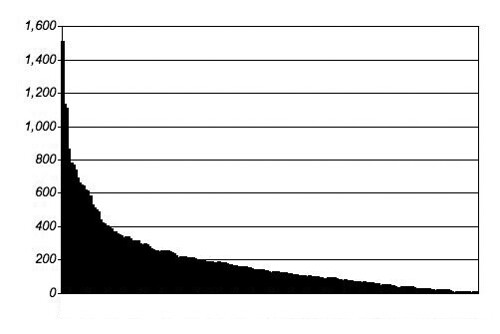In scientific prognostication we have a condition analogous to a fact of archery—the farther back you draw your longbow, the farther ahead you can shoot.
– Buckminster Fuller
The following remarks are rather speculative in nature, as many of my remarks tend to be. I’m sketching large conclusions on the basis of only a few anecdotes. But those conclusions aren’t really conclusions at all, not in the sense that they are based on arguments presented prior to them. I’ve been thinking about cultural evolution for years, and about the need to apply sophisticated statistical techniques to large bodies of text—really, all the texts we can get, in all languages—by way of investigating cultural evolution.
So it is no surprise that this post arrives at cultural evolution and concludes with remarks on how the human sciences will have to change their institutional ways to support that kind of research. Conceptually, I was there years ago. But now we have a younger generation of scholars who are going down this path, and it is by no means obvious that the profession is ready to support them. Sure, funding is there for “digital humanities” and so deans and department chairs can get funding and score points for successful hires. But you can’t build a profound and a new intellectual enterprise on financially-driven institutional gamesmanship alone.
You need a vision, and though I’d like to be proved wrong, I don’t see that vision, certainly not on the web. That’s why I’m writing this post. Consider it sequel to an article I published back in 1976 with my teacher and mentor, David Hays: Computational Linguistics and the Humanist. This post presupposes the conceptual framework of that vision, but does not restate nor endorse its specific recommendations (given in the form of a hypothetical program for simulating the “reading” of texts).
The world has changed since then and in ways neither Hays nor I anticipated. This post reflects those changes and takes as its starting point a recent web discussion about recovering the history of literary studies by using the largely statistical techniques of corpus linguistics in a kind of digital archaeology. But like Tristram Shandy, I approach that starting point indirectly, by way of a digression.
Who’s Kemp Malone?
Back in the ancient days when I was still an undergraduate, and we tied an onion in our belts as was the style at the time, I was at an English Department function at Johns Hopkins and someone pointed to an old man and said, in hushed tones, “that’s Kemp Malone.” Who is Kemp Malone, I thought? From his Wikipedia bio:
Born in an academic family, Kemp Malone graduated from Emory College as it then was in 1907, with the ambition of mastering all the languages that impinged upon the development of Middle English. He spent several years in Germany, Denmark and Iceland. When World War I broke out he served two years in the United States Army and was discharged with the rank of Captain.
Malone served as President of the Modern Language Association, and other philological associations … and was etymology editor of the American College Dictionary, 1947.
Who’d have thought the Modern Language Association was a philological association? Continue reading “Literary History, the Future: Kemp Malone, Corpus Linguistics, Digital Archaeology, and Cultural Evolution”



